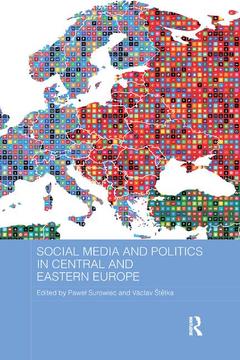Social Media and Politics in Central and Eastern Europe BASEES/Routledge Series on Russian and East European Studies Series
Coordonnateurs : Surowiec Paweł, Štětka Václav

Social media are increasingly revolutionising the ways in which political communication works, and their importance for engaging citizens in politics and public affairs is well understood by political actors. This book surveys current developments in social media and politics in a range of Central and Eastern European countries, including Ukraine and Russia. It explores the process of adoption of social media by politicians, journalists and civic activists, examines the impact of the different social and cultural backgrounds of the countries studied, and discusses specific political situations, such as the 2012 protests in Moscow and the 2014 EuroMaidan events in Ukraine, where social media played an important role. The book concludes by addressing how the relationship between social media and politics is likely to develop and how it might affect the still relatively new democracies in the region.
Foreword
Introduction: social media, politics and democracy in post-transition Central and Eastern Europe
Part I – Political parties, actors and social media
Chapter 1: Who is afraid of the platforms? Adoption of and strategies for use of social media by politicians in the Czech Republic
Chapter 2: The 2014 presidential elections campaign in Romania: connecting with civic-ness on Facebook
Chapter 3: Towards self-mediatization of politics: parliamentarians' use of Facebook and Twitter in Croatia and Hungary
Chapter 4: Personalization of political communication in social media: the 2014 Slovenian national election campaign
Chapter 5: Professionalization and intentional disengagement: Facebook campaigning in the Bulgarian local elections in 2015
Part II: Social movements, interest and professional groups and social media
Chapter 6: We have been to Bolotnaya: Russian protests, the online public sphere and the discourse of division
Chapter 7: The networked public sphere and Ukrainian journalists
Chapter 8: Branding Poland online: propagating and resisting nation branding on Facebook
Chapter 9: The dilemmas of social media-enabled civic activism: the case of sexual minorities in Lithuania
Conclusions
Paweł Surowiec is Senior Lecturer in the Faculty of Media and Communication at Bournemouth University, UK.
Václav Štětka is Lecturer in the Department of Social Sciences at Loughborough University, UK.
Date de parution : 12-2019
15.6x23.4 cm
Date de parution : 09-2017
15.6x23.4 cm
Thèmes de Social Media and Politics in Central and Eastern Europe :
Mots-clés :
Klaus Iohannis; Traian Basescu; Alem Maksuti; Networked Public Sphere; Alena Mackov?; Civil Society; Alina Ryabovolova; Cee Region; Dmytro Hubenko; Political Parties; Galina Miazhevich; Cee Politics; Jan Z?Tock; Social Media; Jernej Prodnik; Social Networking Site; Magdalena Kania-Lundholm; Victor Ponta; Melissa Wall; Ukrainian Journalists; Monica Patrut; Bolotnaya Square; Norbert Merkovity; LGBT Movement; Ognyan Seizov; Cee Country; Pawel Surowiec; Nation Branding Campaign; EuroMaidan Events; Toma DeElan; EuroMaidan Protests; V?Av Tetka; Hybrid Media System; Social Media’s Potential; SNS Adoption; Cee Democracy; Nation Branding; Hungarian Sample; Issue Related Statement; Official Facebook Page



